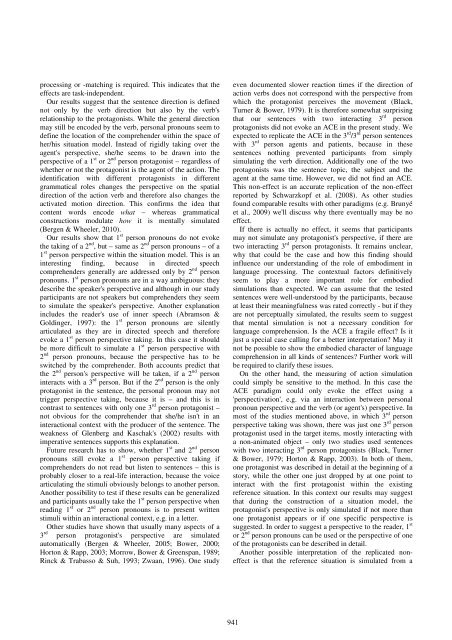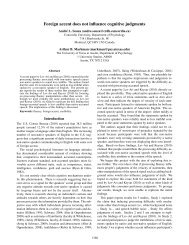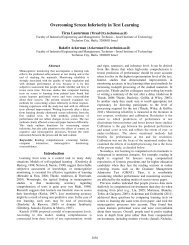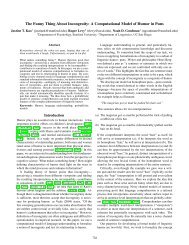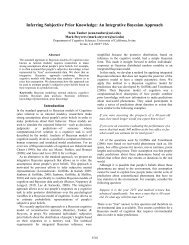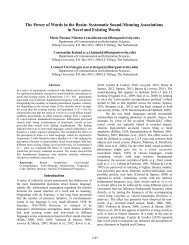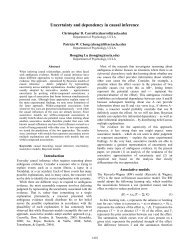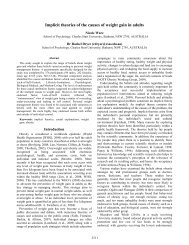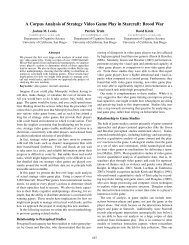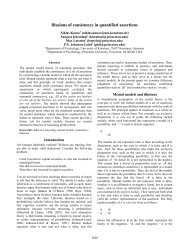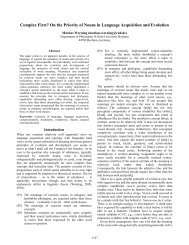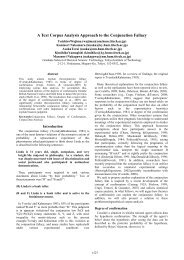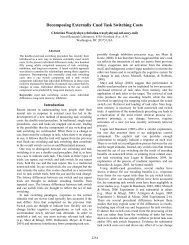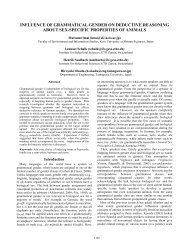Mental Simulation of Spatial Perspective during Sentence ...
Mental Simulation of Spatial Perspective during Sentence ...
Mental Simulation of Spatial Perspective during Sentence ...
Create successful ePaper yourself
Turn your PDF publications into a flip-book with our unique Google optimized e-Paper software.
processing or -matching is required. This indicates that the<br />
effects are task-independent.<br />
Our results suggest that the sentence direction is defined<br />
not only by the verb direction but also by the verb's<br />
relationship to the protagonists. While the general direction<br />
may still be encoded by the verb, personal pronouns seem to<br />
define the location <strong>of</strong> the comprehender within the space <strong>of</strong><br />
her/his situation model. Instead <strong>of</strong> rigidly taking over the<br />
agent's perspective, she/he seems to be drawn into the<br />
perspective <strong>of</strong> a 1 st or 2 nd person protagonist – regardless <strong>of</strong><br />
whether or not the protagonist is the agent <strong>of</strong> the action. The<br />
identification with different protagonists in different<br />
grammatical roles changes the perspective on the spatial<br />
direction <strong>of</strong> the action verb and therefore also changes the<br />
activated motion direction. This confirms the idea that<br />
content words encode what – whereas grammatical<br />
constructions modulate how it is mentally simulated<br />
(Bergen & Wheeler, 2010).<br />
Our results show that 1 st person pronouns do not evoke<br />
the taking <strong>of</strong> a 2 nd , but – same as 2 nd person pronouns – <strong>of</strong> a<br />
1 st person perspective within the situation model. This is an<br />
interesting finding, because in directed speech<br />
comprehenders generally are addressed only by 2 nd person<br />
pronouns. 1 st person pronouns are in a way ambiguous: they<br />
describe the speaker's perspective and although in our study<br />
participants are not speakers but comprehenders they seem<br />
to simulate the speaker's perspective. Another explanation<br />
includes the reader's use <strong>of</strong> inner speech (Abramson &<br />
Goldinger, 1997): the 1 st person pronouns are silently<br />
articulated as they are in directed speech and therefore<br />
evoke a 1 st person perspective taking. In this case it should<br />
be more difficult to simulate a 1 st person perspective with<br />
2 nd person pronouns, because the perspective has to be<br />
switched by the comprehender. Both accounts predict that<br />
the 2 nd person's perspective will be taken, if a 2 nd person<br />
interacts with a 3 rd person. But if the 2 nd person is the only<br />
protagonist in the sentence, the personal pronoun may not<br />
trigger perspective taking, because it is – and this is in<br />
contrast to sentences with only one 3 rd person protagonist –<br />
not obvious for the comprehender that she/he isn't in an<br />
interactional context with the producer <strong>of</strong> the sentence. The<br />
weakness <strong>of</strong> Glenberg and Kaschak's (2002) results with<br />
imperative sentences supports this explanation.<br />
Future research has to show, whether 1 st and 2 nd person<br />
pronouns still evoke a 1 st person perspective taking if<br />
comprehenders do not read but listen to sentences – this is<br />
probably closer to a real-life interaction, because the voice<br />
articulating the stimuli obviously belongs to another person.<br />
Another possibility to test if these results can be generalized<br />
and participants usually take the 1 st person perspective when<br />
reading 1 st or 2 nd person pronouns is to present written<br />
stimuli within an interactional context, e.g. in a letter.<br />
Other studies have shown that usually many aspects <strong>of</strong> a<br />
3 rd person protagonist's perspective are simulated<br />
automatically (Bergen & Wheeler, 2005; Bower, 2000;<br />
Horton & Rapp, 2003; Morrow, Bower & Greenspan, 1989;<br />
Rinck & Trabasso & Suh, 1993; Zwaan, 1996). One study<br />
even documented slower reaction times if the direction <strong>of</strong><br />
action verbs does not correspond with the perspective from<br />
which the protagonist perceives the movement (Black,<br />
Turner & Bower, 1979). It is therefore somewhat surprising<br />
that our sentences with two interacting 3 rd person<br />
protagonists did not evoke an ACE in the present study. We<br />
expected to replicate the ACE in the 3 rd /3 rd person sentences<br />
with 3 rd person agents and patients, because in these<br />
sentences nothing prevented participants from simply<br />
simulating the verb direction. Additionally one <strong>of</strong> the two<br />
protagonists was the sentence topic, the subject and the<br />
agent at the same time. However, we did not find an ACE.<br />
This non-effect is an accurate replication <strong>of</strong> the non-effect<br />
reported by Schwarzkopf et al. (2008). As other studies<br />
found comparable results with other paradigms (e.g. Brunyé<br />
et al., 2009) we'll discuss why there eventually may be no<br />
effect.<br />
If there is actually no effect, it seems that participants<br />
may not simulate any protagonist's perspective, if there are<br />
two interacting 3 rd person protagonists. It remains unclear,<br />
why that could be the case and how this finding should<br />
influence our understanding <strong>of</strong> the role <strong>of</strong> embodiment in<br />
language processing. The contextual factors definitively<br />
seem to play a more important role for embodied<br />
simulations than expected. We can assume that the tested<br />
sentences were well-understood by the participants, because<br />
at least their meaningfulness was rated correctly - but if they<br />
are not perceptually simulated, the results seem to suggest<br />
that mental simulation is not a necessary condition for<br />
language comprehension. Is the ACE a fragile effect? Is it<br />
just a special case calling for a better interpretation? May it<br />
not be possible to show the embodied character <strong>of</strong> language<br />
comprehension in all kinds <strong>of</strong> sentences? Further work will<br />
be required to clarify these issues.<br />
On the other hand, the measuring <strong>of</strong> action simulation<br />
could simply be sensitive to the method. In this case the<br />
ACE paradigm could only evoke the effect using a<br />
'perspectivation', e.g. via an interaction between personal<br />
pronoun perspective and the verb (or agent's) perspective. In<br />
most <strong>of</strong> the studies mentioned above, in which 3 rd person<br />
perspective taking was shown, there was just one 3 rd person<br />
protagonist used in the target items, mostly interacting with<br />
a non-animated object – only two studies used sentences<br />
with two interacting 3 rd person protagonists (Black, Turner<br />
& Bower, 1979; Horton & Rapp, 2003). In both <strong>of</strong> them,<br />
one protagonist was described in detail at the beginning <strong>of</strong> a<br />
story, while the other one just dropped by at one point to<br />
interact with the first protagonist within the existing<br />
reference situation. In this context our results may suggest<br />
that <strong>during</strong> the construction <strong>of</strong> a situation model, the<br />
protagonist's perspective is only simulated if not more than<br />
one protagonist appears or if one specific perspective is<br />
suggested. In order to suggest a perspective to the reader, 1 st<br />
or 2 nd person pronouns can be used or the perspective <strong>of</strong> one<br />
<strong>of</strong> the protagonists can be described in detail.<br />
Another possible interpretation <strong>of</strong> the replicated noneffect<br />
is that the reference situation is simulated from a<br />
941


